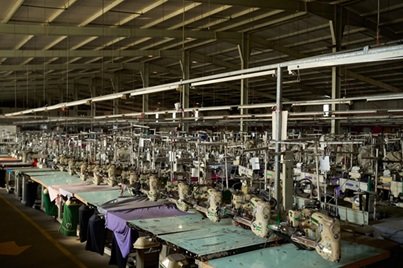MASERU, Lesotho (AP) — The deafening roar of hundreds of sewing machines has gone silent. Spools of thread in every color are covered in dust. The warehouse is dark and empty.
In the tiny African nation of Lesotho, clothing manufacturer Tzicc’s business has dried up in the face of tariffs imposed by U.S. President Donald Trump’s administration. A few months ago, work was steady. The factory’s 1,300 employees have made and exported sportswear to American stores, including JCPenney, Walmart and Costco.
But when Trump announced sweeping new tariffs on nearly all U.S. trading partners in April, Lesotho found itself topping the list, with a rate of 50% — higher even than that of China, where the economy is 8,000 times larger. Officials here and economic experts said they were baffled.
Lesotho’s “minuscule” economy
The tiny African nation of Lesotho was at one point threatened with higher tariffs than even China, despite its economy being thousands of times smaller.
Since then, Trump backed off — temporarily. During a months long pause for trade talks, the U.S. has charged a baseline 10% tariff and announced new rates for dozens of countries starting Friday. Lesotho’s rate will be set at Trump’s whim, with aides suggesting that tariffs charged on goods from smaller African countries could top 10%.
Lesotho’s tiny economy was threatened with giant tariffs
In March, a month before slapping Lesotho with the 50% tariff, Trump described it as a place “nobody has ever heard of,” struggling to pronounce the nation’s name in a speech criticizing U.S. foreign aid.
It’s true Lesotho is a “very minuscule economy,” as its own trade minister, Mokhethi Shelile, described it.
But its relationship with Washington dates back decades. The U.S. was the first country to open an embassy in the capital, Maseru, after Lesotho declared independence from the United Kingdom in 1966. The military received U.S. training, and hundreds of millions in U.S. funds were sent to Lesotho to fight the HIV/AIDS epidemic via the now defunct USAID office and the PEPFAR program.
As textiles grew to become Lesotho’s main export, some 75% of its product went to the U.S. Lesotho became known as Africa’s denim capital. If an American purchased jeans from a U.S. brand.
Source: AP


Leave a Reply